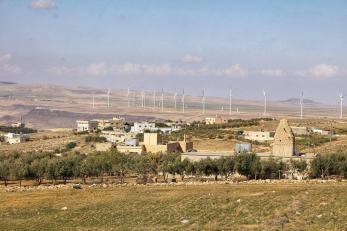LEAD Project: Water security for better lives

Mercy Corps Jordan has officially launched its Livelihoods and Environmental Actions for Development (LEAD) project, with the goal of improving water infrastructure, water and agriculture practices, and facilitating increased access to more profitable and reliable markets for targeted smallholder farmers, food producers, women, and youth in the targeted area.
The LEAD project is funded by the Australian Government's Department of Foreign Affairs and Trade (DFAT) and will be implemented in Zubarieya village in the greater Shobak area of Ma'an, Jordan.
Zubarieya Village, since 1999, has been one of Jordan's few rural communities to use a Community-Based Natural Resource Management (CBNRM) approach. The Zubarieya residents established Al Furat Community Based Organization (CBO) to help manage their water resources, as it operates the village’s water system, collects communal dues, and maintains the infrastructure.
Following the community and technical needs assessment conducted in that area, it was revealed that no proper water system management plan is in place to control excessive water use and network leakage. Moreover, during the assessment visits and interviews, Al Furat CBO members suggested using renewable energy sources, such as installing a solar pump, to alleviate the burden of high electricity bills, which may exceed 3,000 JOD per month.
Mercy Corps, in order to help Al Zubarieya residents build sustainable livelihoods and enhance their resilience, will collaborate with trusted CBOs in Shobak including, Al Furat CBO, Shobak Women’s Charitable Association and Al Zubarieya Charitable Association.
As part of the project's launch, a town hall meeting was held in Zubarieya, and it was attended by 60 men, women, and youth. The attendees were introduced to the project, its objectives, and the primary areas on which Mercy Corps will work in order to help Zubarieya residents better manage natural resources and achieve water security, while also strengthening rural livelihoods and agricultural practices.
The project will focus mainly on three sectors: water security, agricultural management, and livelihood generation. CATALYSE, Permaculture, Social Behavior Change and Communications, and Market-based approaches will all be incorporated into the project. Furthermore, the project will focus on other cross-cutting themes such as Gender Equality, Climate Proofing, and Protection Mainstreaming and Inclusion.
LEAD will serve as a pilot project and has been designed to be scalable within other vulnerable regions of Jordan through the application of mechanisms and systems that can be readily adapted and replicated. The goal is to develop technical and financial capacities that enable smaller, less well off and more remote communities to secure their water supplies and improve their agricultural production in the face of climate change, while also improving the overall efficiency of accessing financial markets/digital services and sustaining their livelihoods on a long-term basis.